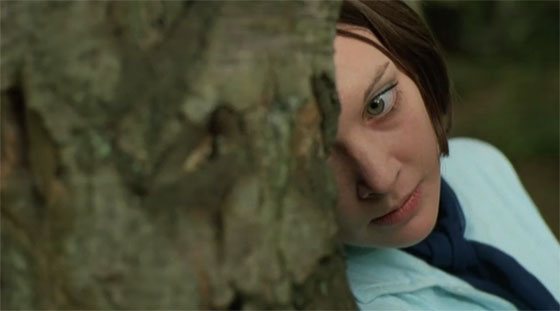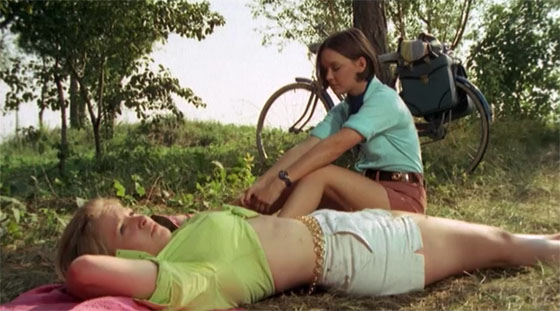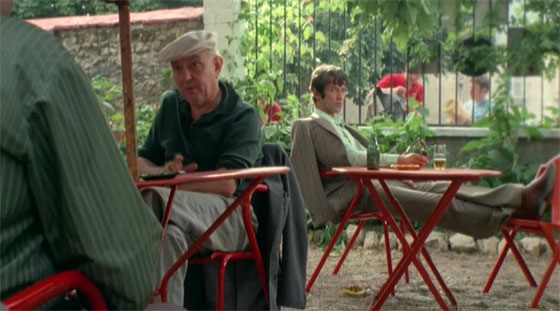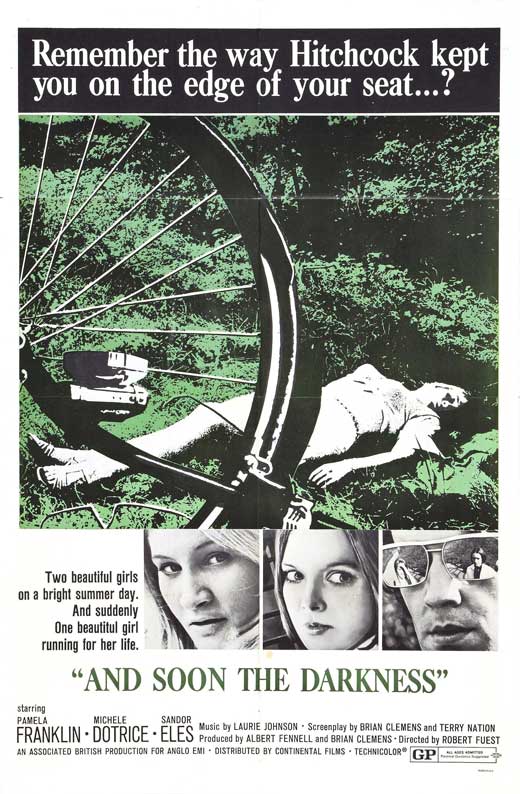
Two English tourists – pretty young women – are spending their summer vacation cycling across the French countryside. At an outdoor café, one of them, Cathy (Michele Dotrice, The Blood on Satan’s Claw), notices a handsome local making eye contact. Flirtation never quite occurs, but as the two girls hit the road, it’s not long before he zips by on his moped – and then stands outside a cemetery, ominously watching them pass, not saying a word. Later the two sunbathe just off the road, barely sheltered by the woods. Jane (Pamela Franklin, The Innocents), the more responsible of the two, suggests they leave before it starts to get dark. Cathy would rather catch more rays. Jane accuses her of delaying them on purpose, just in case that handsome man might come by once more; they fight and part ways. But when Jane, remorseful, bikes back to the clearing, Cathy is gone. She’ll spend the rest of her day trying to find help in the search for her missing companion, growing more desperate as she learns that only three years ago another girl went missing – blonde, like Cathy – before she was discovered raped and murdered. When the stranger offers his help, claiming to be a police detective, can she trust him?

Cathy (Michele Dotrice) and Jane (Pamela Franklin) enjoy a summer day in the French countryside.
And Soon the Darkness (1970) is a very unusual British thriller for the early 70’s. While the local horror market was barreling headlong into more explicit, envelope-pushing brands of exploitation, this is a reserved, deliberately spare throwback to the films of Alfred Hitchcock – a fact which the poster boasts proudly (“Remember the Way Hitchcock Kept You on the Edge of Your Seat…?”). It can easily be compared to both versions of The Man Who Knew Too Much, as well as Roman Polanski’s later homage Frantic (1988). As in Polanski’s film, a great deal of suspense arises from the fact that our protagonist doesn’t know very much French. She spends much of the film just trying to translate her plight; it’s an extra layer for her to penetrate before she can even approach the mystery at hand. Director Robert Fuest – in the midst of a career-changing turn from Wuthering Heights (1970) to The Abominable Dr. Phibes (1971) – wisely spends much of the film’s running time wringing as much suspense as possible from his empty landscape: a road, a forest, a plowed field, a café, a police station. He allows you to draw a map in your mind, because the story depends on it. Jane heads about a mile or two down the road and waits for her friend. She never sees her on the road, so she couldn’t have gotten past her, could she? What if she was hitchhiking? What if she went back the way they’d come? Jane starts to double back…

A stranger (Sandor Elès) keeps his eye on the girls.
The fact that the story is so very simple is both the film’s strength and its weakness. Even as the cast slowly expands – though not by much – you’re limited in your choices as to who the villain might be. And, unlike The Man Who Knew Too Much, there is no tangled conspiracy at work, which means that the plot is rather shallow. Still, it’s intelligent throughout and satisfyingly resolved; and perhaps it’s a benefit that the threat is of a more believable, everyday variety: a murderous sexual predator. Fuest holds your attention, and he’s assisted by a good cast, in particular Pamela Franklin, who, as a teenager, stole the show from Bette Davis in Hammer’s superb The Nanny (1965), and would a few years later play the emotionally fragile psychic Florence Tanner in The Legend of Hell House (1973). Fuest directed episodes of The Avengers TV series, and he’s not the only Avengers veteran here: the music is by Avengers composer Laurie Johnson, and the screenplay by Avengers writers Brian Clemens and Terry Nation. Clemens would go on to write and direct the Hammer cult classic Captain Kronos: Vampire Hunter (1974). And Soon the Darkness was remade in 2010 with Amber Heard, though films like Frantic, The Vanishing (1988), and Breakdown (1997) all mine similar territory to rewarding results.










